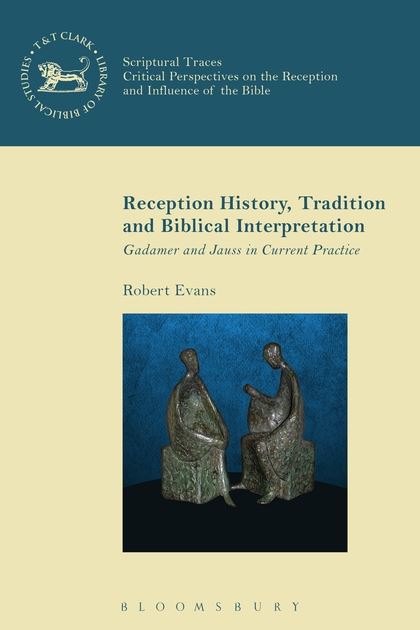In Reception History, Tradition, and Biblical Interpretation, Robert Evans (University of Chester) utilizes the advances of Hans-Georg Gadamer and Hans Robert Jauss in the field of hermeneutics (i.e., the theory of how human understanding and interpretation takes place) to examine the theoretical foundation of recent studies focusing on the reception history of biblical texts.
While the frequency with which the book employs terms like Wirkungsgeschichte (“the history-of-effect principle”) and Auslegungsgeschichte (“history of interpretation”) may initially be intimidating for those with little prior familiarity with German or technical hermeneutics, a helpful glossary of German terms is included before the opening chapter. And indeed, the book’s main contribution lies in the chapters that focus on the theoretical aspects of reception history. There, Evans synthesizes the contributions and debates surrounding Gadamer’s emphasis on the historical-affectedness of human understanding and concludes that “Wirkungsgeschichte in Gadamer is not a history, nor a method, nor a type of reception, but a principle – that alongside the apparent immediacy with which we encounter a text from the past, we need a consciousness that we are already affected by history” (p. 8). In keeping with this conclusion, Evans offers not a method of how to do reception history but rather an examination of “the nature of interpretation…and how different practices reflect this” (p. 25).
To this end, Evans focuses on the implications of Wirkungsgeschichte in three areas: (1) historical-critical exegesis, (2) the progressive process of reception, and (3) and prejudgments in theological hermeneutics. Each of these sections has a chapter devoted to theoretical issues before an examination of those principles in a case-study of Pauline paraenetic texts dealing with submission (e.g., Rom. 13:1, Eph. 5:21–22, Col. 3:18).
Evans maintains that historical-critical methodologies are an integral aspect of reception history. He argues that in contrast to reader-response methods, reception theory regards historical-critical exegesis as an attempt to reconstruct the “horizon of expectation” of a text’s first reception, a horizon which ultimately co-determines interpretation (p. 275). As such, traditional methods, including literary, lexical, and historical studies are integral for the task of biblical interpretation. As a result of his case-study, Evans suggests that though such methods do not offer a singular and certain determination of meaning, they do “offer some, contestable, constraints on the range of meanings and applications” accessible to the first-readers of the text (p. 92).
Evans next discusses the way in which the historical interpretation of texts contributes to modern interpretation because “a biblical text is interpreted over time and in relation to previous interpretation” (p. 114). He examines two different methods for conducting such a study: one which valorizes significant or exemplary trajectories and the other which seeks to discover neglected aspects, which could challenge established traditions of interpretation. While maintaining that both these methods are consistent with Gadamerian hermeneutics, Evans notes the determination of which interpretations to include in such a study inherently demonstrates a pre-existing value judgment.
This then leads to the final section, which examines the role of prejudgments and individual interestedness in reception history. Within this discussion, two different critiques of Gadamer’s Wirkungsgeschichte are evaluated. Some have critiqued Gadamer’s position as “subjectivist” because of its emphasis on the variability of textual interpretation rather than a claimed singularity of authorial intent. Against this critique, Evans suggests that Gadamer emphasizes understanding as a dialectic experience; that is, “understanding is neither merely the reconstruction of the author’s view nor an assertion of the reader’s but results from a dialogic encounter” (p. 258). He also notes that for Gadamer, “A historical text ‘puts a question to the interpreter…to understand a text means to understand this question’” (p. 234).
The other critique of Gadamer is the claim of “conservatism,” which arises from some who claim that in predicating interpretation on tradition, there is no room from which to voice critique of that very tradition. Evans again suggests that Gadamer’s influence on the dialogical nature of understanding creates a “fusion of horizons” that is “neither an appropriation by the interpreter of the prejudgments of the text, nor an imposition of the text on the interpreter’s prejudgments” (p. 240), though one feels that further discussions concerning evaluative judgments within the “fusion of horizons” are still required.
Evans concludes that Gadamerian hermeneutics offer integrity to the whole discipline of New Testament studies which, he suggests, is in danger of fragmenting over various claims of focus and methodology. By affirming both the role of historical-critical methods and the dialogical nature of interpretation, Evans suggests that Gadamer’s Wirkungsgeschichte offers a way forward in which mutual, though not consensual, interpretation of the New Testament texts can continue.
Ultimately, Evans’ treatment is a welcome addition to the conversation of reception history and its implications for biblical interpretation. While the discussions of theoretical issues can be dense, they more than reward close attention with deft synthesis and significant depth. For some readers, Evans’ resistance to state his own interpretive conclusions concerning the case-study texts may be off-putting; however, this should not divert from his contribution to the task of biblical interpretation. The book is a remarkable account of Gadamerian hermeneutics and their benefit for modern biblical studies, and it raises a number of issues and questions that will continue to influence both the theory and practice of reception history.
The Bottom Line: Robert Evans’ Reception History, Tradition and Biblical Interpretation is an important discussion partner in the hermeneutics of reception history and is not to be missed by anyone with an interest in hermeneutics, reception history, and methodological issues of New Testament study.
Review by Eric Covington
University of St Andrews





1 Comment
Leave your reply.